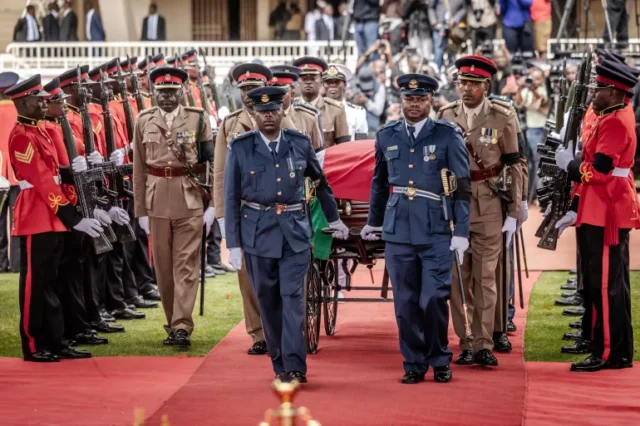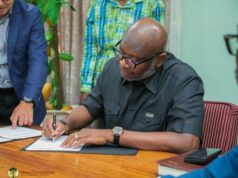Kenya has held a state funeral for revered opposition leader and former Prime Minister Raila Odinga, a towering figure in the country’s political history, whose death has triggered nationwide mourning — and unrest.
The funeral on Friday came just a day after deadly chaos marred a public viewing of his body at a Nairobi stadium, where security forces opened fire on crowds of mourners, killing at least three people and injuring dozens more, according to rights group VOCAL Africa.
Despite heightened tensions, tens of thousands gathered at Nyayo National Stadium to honour Odinga, 80, waving white handkerchiefs and dancing to patriotic music in a venue decorated with massive portraits of the late statesman. Many blew vuvuzelas and whistles in a vibrant yet somber celebration of his life.
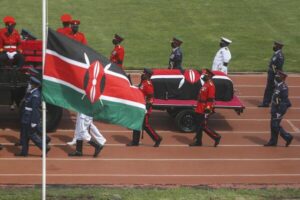
Dignitaries in attendance included President William Ruto, leaders of Kenya’s Parliament and Judiciary, and international guests such as Somalia’s President Hassan Sheikh Mohamud.
Raila Odinga, affectionately known as “Baba” (Swahili for “father”), died on Wednesday from a suspected heart attack while receiving treatment at a health clinic in southern India. His death has left a significant vacuum in Kenyan opposition politics just two years before the 2027 general elections.
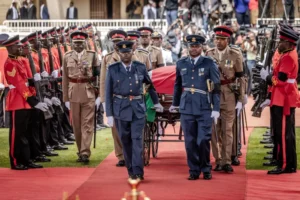
Though he never won the presidency despite five attempts, Odinga is credited with playing a pivotal role in Kenya’s transition to multi-party democracy in the 1990s, and in shaping the progressive 2010 Constitution. He served as Prime Minister from 2008 to 2013 following a power-sharing deal after post-election violence.
In a career defined by shifting political alliances, Odinga famously reconciled with former rival Uhuru Kenyatta in 2018, and later extended an olive branch to President Ruto, moves that earned him both praise and criticism.
“Raila Odinga, the father of democracy in Kenya, was a selfless leader who would risk everything – even his life – to make Kenya work,” said Jean Jerry Abeka, 24, speaking to Reuters at the funeral.
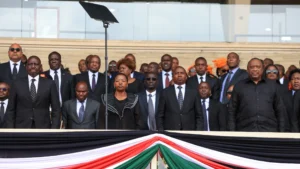
Odinga’s later years were marked by political controversy. As Al Jazeera’s Catherine Soi noted from the funeral, many young people had viewed him as a “betrayer” for aligning with the government during a time of youth-led anti-government protests over economic hardship and corruption.
Still, many chose to focus on his contributions rather than recent discontent.
“Even though there was anger, a lot of them are saying they want to remember him for the things that he did for this country,” Soi reported.
The funeral followed violent scenes on Thursday during the repatriation of his body from India and a public viewing at Kasarani Stadium. As crowds surged toward a VIP entrance, police opened fire. Authorities confirmed three deaths, while local media outlets, including KTN News and Citizen TV, reported at least four fatalities and dozens injured in the crush.
After Friday’s ceremony, Odinga’s body will be transported to his ancestral home in western Kenya, where massive crowds are expected once again on Saturday. A private burial will be held on Sunday, concluding the mourning of a man many see as Kenya’s democratic patriarch.
Odinga’s death raises critical questions about the future of Kenya’s opposition, with no clear successor emerging from within his party or coalition. With the next general election set for 2027, the country faces a potentially uncertain political landscape without the man who, for decades, was its most enduring opposition voice.


